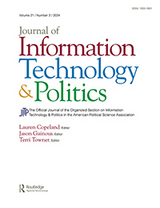External publications

Out of sight, out of mind: the impact of lockdown measures on sentiment towards refugees
Reda Amir Abdul / Semuhi Sinanoglu / Amine AboussalahExternal Publications (2023)
in: Journal of Information Technology & Politics 21 (2) 166-175
DOI: https://doi.org/10.1080/19331681.2023.2183301
Open access
How did COVID-19 related movement restrictions impact sentiment toward refugees? Existing theories offer conflicting answers. On the one hand, contact theories suggest that movement restrictions might reduce casual interactions with refugees, leading to less negative sentiments. On the other hand, integrated threat theories suggest refugees may be perceived as a security threat and blamed for these movement restrictions in the first place. To gauge the effect of movement restrictions, we investigate the effect of physical isolation on sentiments toward refugees in Turkey by using a novel dataset. We use Google Mobility Reports’ measurements of movement and our measures of sentiments toward refugees using refugee-related tweets from Turkey. Statistical analysis shows that xenophobic sentiment generally decreased during the pandemic. Our study shows that different types of reduced mobility correlate with increased sympathy toward refugees: the more people stay at home, the more positive sentiments toward refugees they exhibit on Twitter. We conclude by proposing two possible causal mechanisms for these findings. The findings suggest that the absence of casual contact with refugees may yield less negative sentiment, and/or that a rally around the flag mechanism yields unprecedented levels of social solidarity in response to the pandemic.
Contact
Cornelia Hornschild
Publication Coordinator
E-mail Cornelia.Hornschild@idos-research.de
Phone +49 (0)228 94927-135
Fax +49 (0)228 94927-130
Alexandra Fante
Librarian/ Open Access Coordinator
E-Mail Alexandra.Fante@idos-research.de
Telefon +49 (0)228 94927-321
Fax +49 (0)228 94927-130


![[Translate to English:] Photo: Alexandra Fante, Bibliothekarin/Open Access-Koordinatorin](/fileadmin/_processed_/f/0/csm__c_Deutsches-Institut-fuer-Entwicklungspolitik_Fante_94ce4fa1ba.jpg)